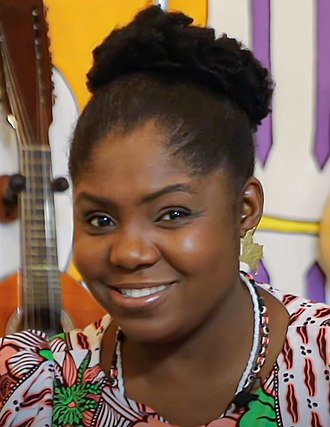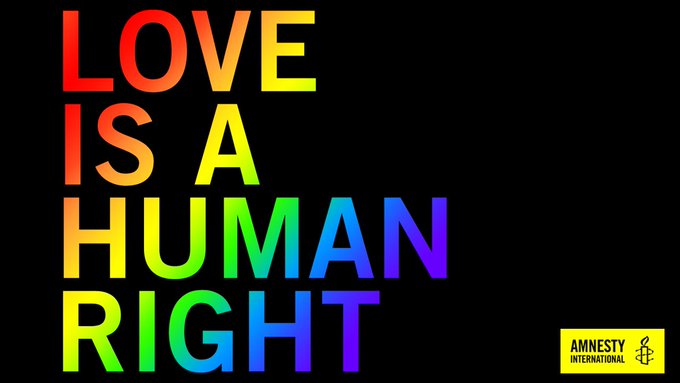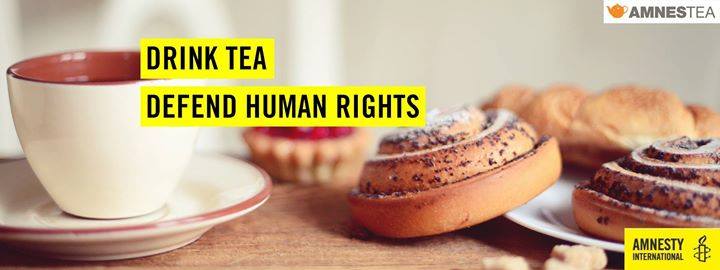Here is our latest Newsletter with updates and actions.
Türkiye
The United Nations acknowledged the state’s registration of its name as the Republic of Türkiye as of 26 May 2022. Accordingly, Amnesty International will adopt the new spelling of the country’s name in all its communications from now on.
The Saturday Mothers
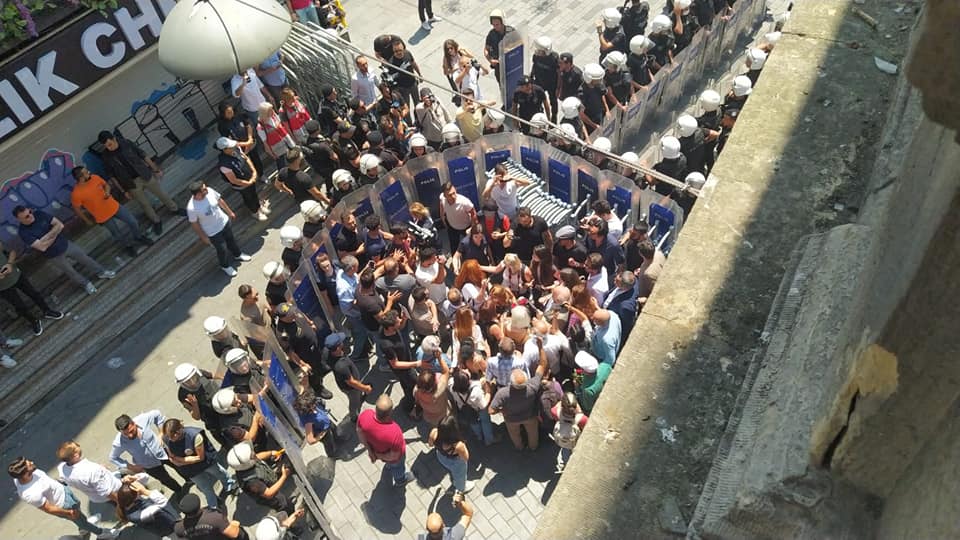 On 24 June the group known as the Saturday Mothers who have been demonstrating for 27 years on behalf of people who “disappeared” during the 1980s and 90s attempted to hold their 900th vigil in Galatasary Square, Istanbul.
On 24 June the group known as the Saturday Mothers who have been demonstrating for 27 years on behalf of people who “disappeared” during the 1980s and 90s attempted to hold their 900th vigil in Galatasary Square, Istanbul.
Riot police immediately moved in to prevent the vigil by the human rights defenders, handcuffed and detained the head of the Human Rights Association, Öztürk Türkdoğan, prominent human rights lawyer, Eren Keskin, and several relatives of victims of enforced disappearances.
Amnesty International’s Deputy Director for Europe, Julia Hall said:
“For the past 27 years, the Saturday Mothers have tirelessly sought truth and justice for their loved ones who were forcibly disappeared in the 1980s and 1990s. Riot police arbitrarily detained people who were peacefully participating today’s landmark Saturday Mothers/People vigil. This is only the latest shameful example of the state authorities’ intolerance of lawful, peaceful dissent.
“Time and again, the Saturday Mothers/People have been met with brutal crackdowns and even prosecutions for taking part in peaceful vigils. Turkish authorities have never provided a valid justification for their spiteful, arbitrary and unlawful denial of the right to exercise freedom of expression and assembly.
“Turkish authorities must immediately and unconditionally release all those arbitrarily detained solely for exercising their right to peaceful expression and assembly. The four year-long unlawful, arbitrary ban on assemblies in Galatasaray Square must be lifted, Saturday Mothers/People and others who wish to exercise their right to peaceful protest in this iconic square must be allowed to do so.
Thankfully those detained as they attempted to commence the vigil were later released. The photograph above shows them celebrating their release at the Human Rights Association offices in Istanbul.
The Gezi 7 (including Osman Kavala)
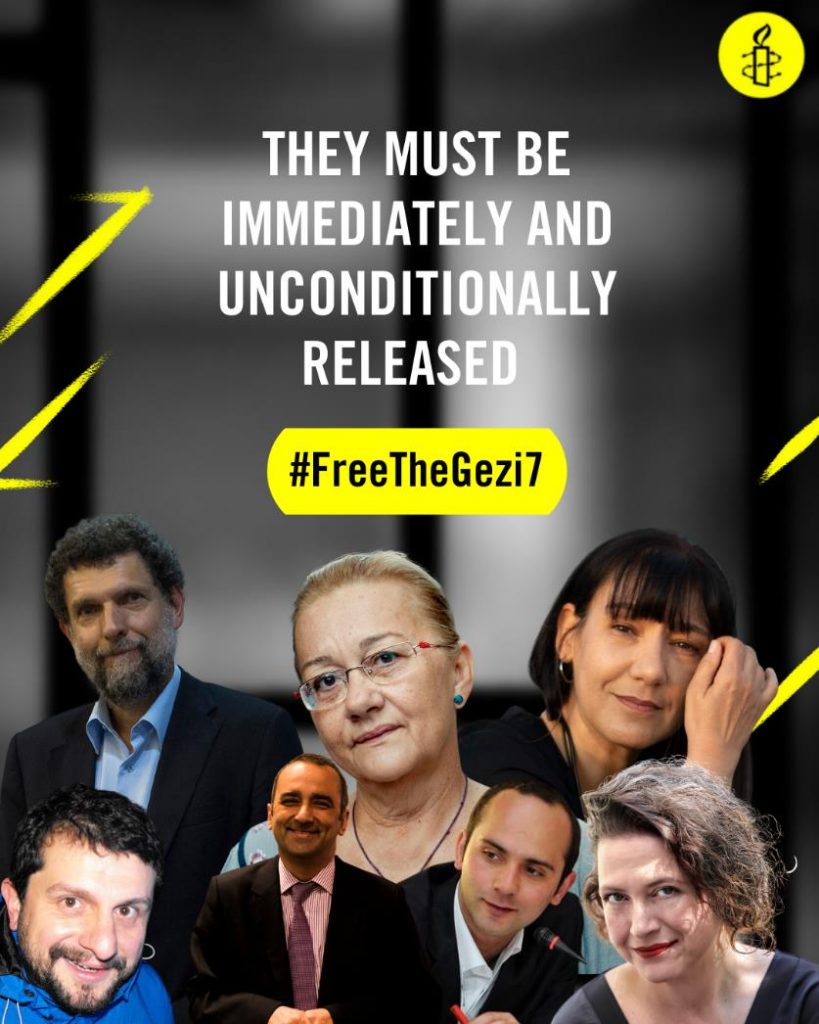 As I reported in the May Newsletter, at the conclusion of the long running Gezi Park trial on 25 April Osman Kavala , was convicted for “attempting to overthrow the government” and sentenced to aggravated life in prison. His seven co-defendants each received a sentence of 18 years, allegedly for aiding him.
As I reported in the May Newsletter, at the conclusion of the long running Gezi Park trial on 25 April Osman Kavala , was convicted for “attempting to overthrow the government” and sentenced to aggravated life in prison. His seven co-defendants each received a sentence of 18 years, allegedly for aiding him.
Human rights defender and philanthropist Osman Kavala has been held in Silivri high security prison No. 9 since 1 November 2017 and received an aggravated life sentence with no possibility of parole for ‘attempting to overthrow the government’ under article 312 of the Turkish Penal Code for his alleged role in financing and organising the mass 2013 Gezi Park protests. Architect Mücella Yapıcı; film producer Çiğdem Mater; documentary filmmaker Mine Özerden; lawyer Can Atalay; city planner Tayfun Kahraman; Director of Boğaziçi European School of Politics Hakan Altınay; and a founder of Istanbul Bilgi University Yiğit Ali Ekmekçi were each sentenced to 18 years in prison for allegedly aiding Osman Kavala. The Istanbul Heavy Penal Court No. 13 also ruled that these six defendants who were previously on bail be immediately remanded in prison.
Mücella Yapıcı, Çiğdem Mater and Mine Özerden were taken to Bakırköy women’s prison. Can Atalay, Tayfun Kahraman and Hakan Altınay were taken to Silivri high security prison where Osman Kaval has been held.
(A warrant has been issued for the arrest of an eight defendant Yiğit Ali Ekmekçi, who wasn’t in the courtroom the time of the verdict and is NOT part of current campaigning by AI.)
Amnesty International has closely monitored both the first and second Gezi prosecutions. The prosecuting authorities have not provided evidence to support the charges levelled against the defendants, a fact that led to their acquittals in the first trial in February 2020. As demonstrated by the dissenting opinion of one of the judges in the second trial, there is no evidential basis for the conviction of the defendants who AI considers to have been convicted in a politically motivated, unfair trial. [Read more…]
